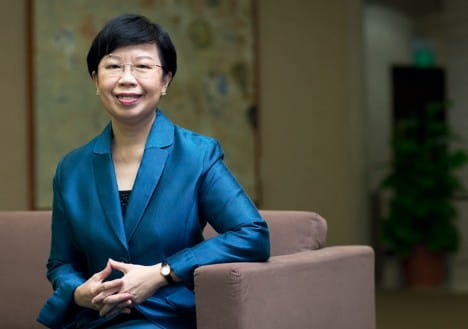Stories > Space for Change
Space for Change
Prof Lily Kong was recently appointed the fifth president of Singapore Management University (SMU). A former Governor with SIF, she examines the role of urban planning in shifting societies, and the importance of adapting across cultures.
BY LILY KONG
ne of the key phenomenon confronting many societies today is the growth in migration, which brings people of different ethnicities, faiths, cultures and nationalities into contact.
This is not new, but the size and scale of migration have increased rapidly in recent times. This has had the effect of developing sentiments against migrants in many societies. Much of this stems from a lack of understanding of other peoples, as well as a real or perceived competition for jobs, schools and, fundamentally, space.
For example, with religious tensions – where temples are refused building permits, or proselytisation is prohibited – it is clear that the solutions need to be multi-pronged. Education for fostering greater understanding is a fundamental part of it.
Additionally, sound policies are critical, whether it is in sensitive urban policy planning, robust economic planning or even-handed social policy.
As a social, cultural and urban geographer, I explore complex socio-spatial issues such as these, tracking cultural change in Asian cities. This leads us to the topic of Asia’s rapidly growing urban areas, which include Singapore.
Cities are often thought to be atomising. Social cohesion is difficult to foster amid the fast pace of life, social divides, sheer mass of people and the conflict that can arise from highly proximate living.
“There Is No Underestimating The Value Of Informal Chats, Community Walks And Serendipitous Encounters That Allow For The Building Of Interpersonal Ties And Understanding.”
In an urbanised country such as Singapore, breaking down the city to human scale – such as with urban precincts of a size and scale where people will have a chance to meet and interact, whether by design or serendipitously – can be helpful.
Evidently, good utilisation of space can effect positive social change. Many will refrain from applauding social engineering, but Singapore’s ethnic quota policy in our public housing estates – where the ethnic profile at the estate level is kept roughly similar to that at the national level – represents spatial and social planning working in tandem to prevent the development of an ethnically segregated city. However, it would be presumptuous to say that there are lessons in this for our foreign counterparts, as what works in Singapore may not work in another context.
GROWING WITH FLEXIBILITY
For a long time, Singapore has operated by diligently studying practices elsewhere, adopting and adapting where appropriate to fit its context. This has allowed Singapore to learn quickly from others in areas like social cohesion, education and urban planning while avoiding the pitfalls elsewhere. Increasingly, however, Singapore finds that it is confronting new challenges that others have also yet to resolve. One of these involves its workforce.
With technological advancements such as artificial intelligence and increasing human longevity that has in turn lengthened one’s productive work life, it is clear that an undergraduate degree achieved in one’s early 20s is not going to offer all the learning that is necessary to last the next 40 to 50 years. It is thus important that graduates have the opportunity to upskill and reskill.
Another challenge we are still finding ways to resolve is climate change, which can only be mitigated by changing social attitudes and, importantly, behaviours.
To shift behaviours, both practical measures (from taxation to incentives) and belief systems will need to be addressed. For example, religious beliefs can be a powerful anchor for our attitudes and behaviours towards the environment.
In the course of my work at SMU, I’ve had to work across cultures, which requires me to be much more conscious of my own assumptions, tacit knowledge and norms.
“Sound Policies Are Critical In Fostering Better Understanding Among People, Whether It Is In Sensitive Urban Planning, Robust Economic Planning Or Even-handed Social Policy.”
Prof Lily Kong, President Of Singapore Management University
By working across cultures, I refer not only to national or ethnic cultures but institutional ones too. We can easily assume different ideas and practices to be the norm, when in fact they are particular to an institution, country or culture. I’ve long learnt to make more explicit our assumptions, describe what we take for granted, and articulate clearly what our practices are, so as to reduce misinterpretations.
One meaningful cross-cultural collaboration I’ve been involved in is working on establishing the Yale-National University of Singapore (NUS) College during my tenure at NUS. This gave me lots of opportunities to learn how to work with Americans, but in the process also develop ties. Through my counterparts, I learnt how every word has to be parsed carefully, and the importance of phrasing every intention and aspiration into precise terms that are legally binding, to avoid misintepretation.

Prof Lily Kong who is the president of Singapore Management University, explores complex socio-spatial issues and tracks cultural change in Asian cities.
ACADEMIC EXCHANGE
SMU is no stranger to successfully adapting the practices of others to our advantage. We’ve modified the principles of the Wharton model of business education to suit our own context, thus making SMU a uniquely Singaporean and Asian university.
The university is a microcosm of society and, thus, must be a place to encourage open dialogue among people of different cultures and backgrounds. Creating the platforms for an open exchange of ideas is important. While universities typically host seminars and town halls, there is no underestimating the value of informal chats, community walks, and serendipitous encounters that allow for the building of interpersonal ties and understanding.
